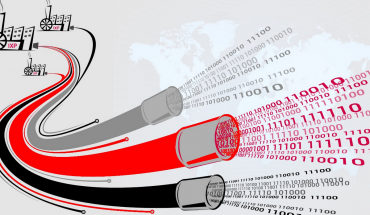More coverage: Will Internet Metering Slow Down Your Movie Downloads from Netflix?
###
There wasn’t much reaction to a recent blog post here about Internet metering and how that might affect the cost of downloading movies and stuff.
But, if some elected politicians get their way, it will be a topic of national debate.
They know a new usage-based billing policy for Internet use in Canada takes effect March 31.
The Canadian Radio-television and Telecommunications Commission (CRTC) says telecommunications companies will be permitted to charge third-party Internet service providers for usage-based billing.
And some Internet bills are sure to rise as a result of the agency’s ruling, industry and technology watchers say.
Right now, many of us are on some sort of Internet service data plan, in which usage – up to a point – is covered by one flat fee. If we use more data, the may be a surcharge. (And while there are surely people who use less than their plan allows, I have yet to see one that gives a rebate for that lower usage.)
So the CRTC’s decision, released on Tuesday, reaffirms earlier positions that not only allow larger telecommunications companies to charge for the services they provide, they can now pass along bandwidth caps and overage charges to smaller third-party providers that are using their resources and infrastructure.
‘In this decision, the Commission determines that usage-based billing rates for an incumbent telephone carrier’s wholesale residential Gateway Access Services or equivalent services, and for an incumbent cable carrier’s third-party Internet access services, are to be established at a discount of 15 percent from the carrier’s comparable usage-based billing rates for its retail Internet services.’
In other words, in its decision (called Usage-based billing for Gateway Access Services and third-party Internet access services), the CRTC gave the smaller ISPs a 15 percent discount on the retail rates larger carriers charge their own customers, saying this would help maintain a competitive balance.
Larger players like Bell and Rogers have had data caps for some time, so they can charge overage fees to users who exceed a specified data consumption plan, but many smaller players have been offering flat-rate, all-you-can-use plans or very high data caps as a point of market differentiation.
These kinds of competitive offerings could end as a result of the CRTC’s decision, critics say.
In fact, NDP MP and digital affairs critic Charlie Angus wants the matter to become a point of national debate. He warns that free and open access to the Internet in Canada is under threat.
(Vancouver’s City Council apparently feels much the same – it passed a motion calling on the CRTC to not allow metered Internet billing.)
Angus says usage-based Internet billing will unfairly hit Canadian consumers in the pocketbook and not just affect so-called ‘bandwidth hogs.’
“Allowing the Internet service providers to ding you every time you download is a rip-off. Canada is already falling behind other countries in terms of choice, accessibility and pricing for the Internet.”
However, cablecos and telcos note that providing increased Internet use and access is a capital-intensive activity, requiring huge financial investments and commitments to maintaining infrastructure that must be paid for.
ISPs also note that information about usage and consumption is available to consumers, empowering them to make purchase decisions most appropriate for their budget and service needs.
Nevertheless, industry observers and consumer advocacy groups anticipate most ISPs will pass new charges and usage caps to their customers.
“The CRTC has once again left the wolves in charge of the henhouse,” said Steve Anderson, national coordinator for an open Internet access group known as OpenMedia.ca. The group’s online petition garnered more than 40,000 signatures resisting Internet restrictions though its ‘Stop the Meter’ campaign.
“Canadians have come out in unprecedented numbers and demanded an affordable Internet, and while there is evidence that this has moved the CRTC, they have not gone nearly far enough.”
What’s more, business development and entrepreneurial activity in the digital media and information technology sector will suffer, critics say, due to the increased costs of Internet access that are anticipated.
“It’s deeply disappointing that the Commission has decided to give a few companies a free hand to engage in economic discrimination and crush innovation,” Anderson continued. “Now is the moment for forward-looking, visionary policymaking, not half-measures and convoluted compromises with the companies trying to kill the open Internet.”
UBB, user based billing, is often seen as an ITMP tool – one used, that is, as an Internet traffic management protocol. As such, it is often seen as a threat not only to pocketbooks, but also to a neutral Internet, one open to all equally, whether consumer or provider.
Nevertheless, third-party ISPs are said to account for just four or five per cent of the total Internet users.
Perhaps more to the point, be they large or small, today’s ISPs are private companies, for-profit businesses. By their very mandate, they are expected to profit from their activities.
But that approach, common as it is, is not the only one.
Seen as a ‘utility’, there could be a case to make for the Internet being a public, not-for–profit enterprise.
It’s integrated itself into our personal and professional lives almost as much as any other utility.
And like the water main, the data pipe would be billed by actual usage, with all margins put back into the system.
submitted by Lee Rickwood
More coverage Will Internet Metering Slow Down Your Movie Downloads from Netflix?
# # #
So, what’s your tech?
Are you ready to pay more for Internet access?
Think we all pay too much already?





All I got to say is the first step is yourself. If they do this discontinue services with that ISP right away and stop using internet period till they change. Sick and tired of big people making all the rules. Stop using the services from these companies who dont even allow us to vote if this is fair or not!
What is kind of troubling to me is that even if I wanted to stay within my limits of internet usage so that I didn’t have any overages charges, I don’t know how to do that. I don’t know how many bites loading a certain page uses. I don’t know how many of my friends’ pictures I can look at on Facebook; I don’t know how much online shopping I can do. How can we even make decisions on this? Telecom companies charge for phone use by the minute for cell phone & long distance charges. That, I get. That, I can control. How many bites a website is… how can I control that?
This is just another step towards a total dictatorship of the internet by these companies. Soon they will be telling us what websites we can access and what we can, depending on our subscription. Looks like we will know soon enough what people in China have had to face with their internet policies. The CRTC should be replaced.
Ok first of all its not like power or water, a better analogy is a highway. It’s a transportation method for the distribution of goods and services among multiple industries. If you can’t see that then people don’t bother to write an article on the internet. It’s like listening to a 5 year old talk about brain surgery.
It costs an ISP, on average, 1 cent to transfer 1 gigabyte of bandwidth – paying 30 dollars a month for internet should entitle me to a max of 3 terabytes if profit was not a concern. Why the hell am I going to be overcharged for using 1/30th of that?
This is outrageous, and the CRTC is horrible.
this appears to be going back to the days of when you used more on dialup .Why these giants want more money kinda screws with your head.